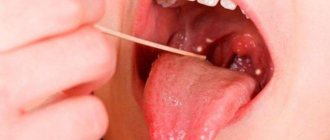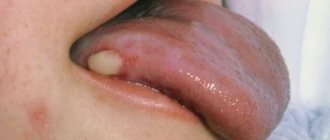We are used to the fact that we need to go to the dentist if we have problems with our teeth or gums. What to do if you have inflammation of the tongue or glossitis? Dentists identify more than 10 types and subtypes of infection. The infection can be caused by both fungus and bacteria. Viral infection is less common. Inflammation can be caused by a lack of certain vitamins and minerals, or hormonal changes. There are many reasons for the disease, so it is important to identify what exactly caused the inflammatory process.
Causes of glossitis
- improper oral hygiene;
- bacterial infection;
- fungal infection;
- heavy metal poisoning;
- bad habits (smoking, alcoholism);
- congenital pathologies of the tongue (folded tongue);
- allergic reaction;
- tongue injury (often caused by malocclusion);
- oral infections;
- lack of iron in the body;
- burn of the mucous membrane (hot food or drinks);
- infectious diseases (AIDS, tuberculosis, scarlet fever, measles).
Reasons for the appearance of a lump
A tumor can appear for various reasons. If the pain is not severe, temporary, and goes away on its own within a day, there is nothing to worry about. And when the appearance of a growth causes significant discomfort and lasts for several days, you should be alarmed. A growth under the tongue near the frenulum can be caused by the following factors:
- Condylomatosis, that is, papilloma virus. In this situation, the cell growth mechanism is disrupted. The early phases of the disease have no obvious symptoms. The virus is actively transmitted through household and sexual contact, especially with weak immunity. The nature of warts is such that they act selectively. HPV is distinguished by genotypes. There are benign and life-threatening strains. Warts may rise above the muscular organ. Keratin, which is produced in such cells, gives the balls rigidity.
- Inflammation often appears when the frenulum is short from birth. It is better to correct the problem in childhood.
- The process of inflammation appears with vitamin deficiency, gastrointestinal diseases, allergies, abscesses in the oral cavity, and injuries.
- A pimple on the frenulum under the tongue is formed during tonsillitis, when streptococci and staphylococci are activated and the lymph nodes are affected.
- The problem occurs when the salivary duct is blocked. Mineral or mucus plugs can become an obstacle. This interferes with patency. In this situation, a ranula is formed, which contains liquid exudate. The bubble may be clear or cloudy. It can burst, then build up again. Provoking factors include stomatitis, herpes, candidiasis, and lichen planus.
Since the mucous tissues of the oral cavity are sensitive, they can be damaged by hot food or drink. In the burn area, bacterial microflora feels comfortable, which contributes to the formation of salivary plugs in the ducts.
The most common types of glossitis
The most common occurrences in dental practice are:
- acute catarrhal glossitis;
- tongue abscess;
- desquamative glossitis.
Acute catarrhal glossitis is the most common type of inflammation. Inflammation can be caused by microbes or mechanical damage to the tongue. The predominant symptoms are pain, redness and swelling.
A tongue abscess is the appearance of an abscess in the tongue. The abscess can be superficial, under the mucous membrane, or maybe in the thickness of the tongue. Abscesses in the thickness of the tongue, in addition to pain in the tongue, can cause a disturbance in the general condition. A person develops a fever, a headache, and weakness. Most often occurs due to injury to the tongue.
Desquamative glossitis, also known as “geographic tongue,” most often appears in children. It appears in the form of various spots on the tongue, which look like a white coating, alternating with areas of pink mucous membrane. There are no changes other than appearance. Scientists have identified a clear reason for it. The main factors are believed to be bacteria, allergic reactions and hormonal imbalances.
Treatment of ulcers under the tongue
If a parent discovers a sore in the child’s tongue area, he should immediately take him to a dentist for examination. This is the doctor who deals with such diseases. He will conduct an examination and, if necessary, ask the patient to see a doctor of another specialization.
Traumatic ulcer during teething
To make a diagnosis, the doctor must talk with the patient. This will allow us to understand the nature of the lesion in the oral area. A microscopic examination will also be required.
The easiest way to understand how to treat ulcers that appear as a result of mechanical damage. As a rule, they heal fairly quickly if the affected area is provided with suitable care. To quickly get rid of a sore that has formed under the tongue, you must immediately treat it with an antiseptic. Can be used:
- hydrogen peroxide;
- brilliant green;
- propolis spray;
- soda solution.
Propolis spray effectively heals wounds
This antiseptic treatment is usually prescribed for stomatitis. Additionally, vitamin complexes are prescribed.
Individual therapy must be selected for each patient. In addition to treatment with an antiseptic, the attending physician may prescribe:
Painkillers. They contain benzacaine or lidocaine. Ointments and gels based on corticosteroids. Flucinocide is especially in demand. In particularly severe cases, corticosteroid drugs are used. They are necessary for patients who suffer from recurrent aphthous stomatitis.
Squamous cell carcinoma at the bottom of the tongue
If the ulcers were caused by herpes, the patient is prescribed the use of local medications, this may be Acyclovir ointment. Candidal stomatitis cannot be defeated without antifungal drugs, which are used in local and internal treatment.
READ ALSO: Stye or conjunctivitis: what is the difference, the main differences
When stomatitis is accompanied by deterioration in health, namely fever, inflammation of the lymph nodes and exacerbation of a number of diseases, then the patient is immediately sent to the hospital. It is very difficult to cure a patient, especially a child, at home in such a situation.
Tongue herpes in a child is very painful
Symptoms of glossitis
- increased salivation;
- swelling and redness;
- pain and burning when eating;
- plaque on the tongue in the form of spots;
- bad breath;
- papillomas or warts on the tongue;
- speech disorder;
- foreign body sensation.
Prevention of glossitis - high-quality oral hygiene and no bad habits. It is important to undergo timely preventive examinations and also eat well. All these factors actively contribute to the development of the disease and bring a number of problems.
How does the infection manifest and why is it dangerous?
The most striking symptom of oral candidiasis is a white, loose coating on the mucous membrane. It mainly covers the tongue, cheeks, and may affect the gums and palate. Plaque can be easily scraped out; the tissue underneath is prone to redness and may bleed. Other signs of the disease include:
- unpleasant taste;
- dry mouth;
- burning;
- the appearance of cracks in the corners of the lips;
- difficulty or painful swallowing;
- unpleasant sensations with habitual movements of the tongue.
Candidiasis can be acute or chronic. In most cases, it is the acute form that manifests itself; the chronic form is typical for carriers of HIV infections and smokers. Depending on the degree and form of the disease, other symptoms may be observed, so even if one or two appear, you should immediately contact your dentist.
Treatment of glossitis
A specialist must make an accurate diagnosis and identify the cause of the disease. If you suspect that you have glossitis , and all symptoms indicate this, contact your dental clinic. This is the only way to create the right treatment plan and provide timely assistance. Quite often in such cases, doctors prescribe antibiotics, anti-inflammatory drugs and rinsing the mouth with special antiseptic solutions. In advanced stages, glossitis is treated surgically. Deep abscesses must be opened in the maxillofacial department. Under no circumstances should you take medications without a doctor’s recommendation.
You can cure glossitis, caries or any other diseases of the oral cavity right in your sleep. Family Dentistry Center "Medexpert" provides dental treatment under medicinal sedation. Thanks to this approach, the patient falls into a healthy sleep, ceases to feel pain and discomfort, while the vital functions of the body remain unchanged. Sedation is widely used in pediatric dentistry and even helps fight dental phobia. Dental treatment can be comfortable and painless - tested for yourself.
Which doctor should I contact?
If a lump appears under the tongue on the frenulum, you need to find out what factors provoked its formation. Only a doctor can correctly determine the cause. After all, the ball can be filled with liquid or consist of epithelial cells. The degree of discomfort depends on the size of the formation. When papillomas are soft, the patient may not feel them, but large inflammatory growths interfere and begin to hurt. Contact your doctor if you experience any of the following symptoms:
- The mucous tissues of the oral cavity constantly dry out;
- The deficiency of saliva and its composition is clearly expressed;
- The taste sensations have changed a lot;
- Increasing pain appeared;
- Swelling on the face increases;
The affected tissue around the lesion may become red and begin to bleed. First of all, you should consult with your local therapist. To confirm the suspected diagnosis, it is most often necessary to visit a dermatologist, dentist, otolaryngologist, venereologist, or gastroenterologist. If the need arises, the patient is referred to a surgeon or oncologist. During the examination, the doctor collects anamnesis, conducts a thorough examination, and performs laboratory diagnostics and histology. In complex cases with abscesses, patients are referred for ultrasound examination, as well as computed tomography. The pathogen is detected using a cytological analysis of saliva.
Which people are at risk for stomatitis?
As already noted, children are primarily susceptible to stomatitis, since their immune system is just learning to fight infections and diseases and respond to irritants appropriately. Therefore, if, with timely consultation with a doctor and proper treatment, your baby still chronically develops stomatitis in the mouth, then perhaps the reason is due to age, and over time these problems will disappear.
But besides age, there are other factors that increase the risk of stomatitis ulcers in a person’s mouth. They are associated with various reasons, some of which we have already named when characterizing the types of stomatitis, but now we will try to specify each factor separately.
Those at risk for possible development of stomatitis include:
- People with a hereditary predisposition to the disease. Scientists have proven that the likelihood that stomatitis will develop in a person’s mouth (on the palate, mucous membrane, throat or tongue) increases if one or both parents have ever encountered similar problems. The best way out in this situation is to follow the rules of oral hygiene and take vitamin and immunomodulatory complexes as prescribed by your doctor.
- People with current somatic diseases. Quite often situations arise when stomatitis chronically develops in a person’s mouth without any obvious reason. During a complete examination of the body of such a person, any diseases are usually revealed, in particular, diseases of the gastrointestinal tract (giardiasis or helminthic infestations). Parasites, while in the body, may not manifest themselves in any way and not bother a person for years, but they reduce his immunity and prevent resistance to infections and other diseases. In this case, in order to get rid of stomatitis in the oral cavity, a person should undergo a course of treatment that will allow him to get rid of other concomitant diseases.
- People with reduced immunity. Human immunity is reduced not only by somatic diseases, but also, for example, by factors such as stress. Therefore, if you have a hard job or tense family relationships, this can cause chronic stomatitis, localized on the oral mucosa. In addition, frequent occurrence of ulcers in a person's mouth may indicate more serious problems with the immune system caused by a disease such as AIDS. Therefore, in this situation, a person is recommended to get tested, undergo a full examination of the body and get plenty of rest.
- People with bad habits. Bad habits such as alcohol, smoking and drug use can cause stomatitis and the formation of painful ulcers in the mouth. The fact is that such a lifestyle weakens the immune system and undermines human health. In addition, cigarette smoke and alcohol create favorable conditions in the oral cavity for the development of bacteria, viruses and fungal infections, which provoke the appearance of stomatitis ulcers on the human mucosa.
If you have seen photographs of people with stomatitis in the mouth, then you have probably noticed how unattractive this disease looks, not to mention how much discomfort it causes to a person. Therefore, if you are at risk for the possibility of developing stomatitis ulcers on the mucous membrane, palate, throat or tongue, then you should take measures to reduce the chances of getting stomatitis: quit bad habits, undergo a course of treatment for somatic diseases, increase your immunity and take vitamin complexes. But these measures should be taken only after consulting a doctor.
The main causes of sores on the tongue
The main reasons for the development of pathology are:
- Diseases of the oral cavity (various types of stomatitis, Bandar's ulcers).
- Injuries to the mucous tissue in the mouth.
- Severe diseases (necrotizing gingivostomatitis, tuberculosis, syphilis, HIV, cancer).
The mucous membrane can be damaged in the following cases:
- using a hard toothbrush;
- the presence of a pointed edge of a tooth or filling;
- accidental tongue biting;
- consumption of a food product or medicine that can provoke the development of irritation in the oral cavity;
- the presence of low-quality dentures or braces.
During pregnancy, stomatitis can occur as a result of hormonal imbalance.







